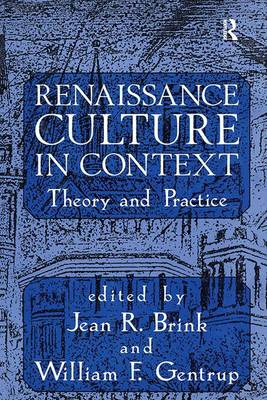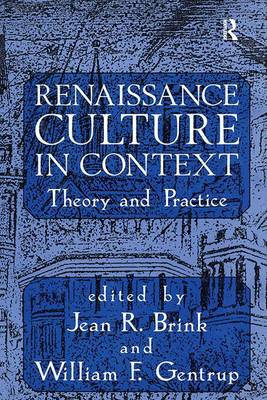
- Retrait gratuit dans votre magasin Club
- 7.000.000 titres dans notre catalogue
- Payer en toute sécurité
- Toujours un magasin près de chez vous
- Retrait gratuit dans votre magasin Club
- 7.000.0000 titres dans notre catalogue
- Payer en toute sécurité
- Toujours un magasin près de chez vous
Renaissance Culture in Context
Theory and Practice
Jean R Brink, William F Gentrup
Livre relié | Anglais
182,45 €
+ 364 points
Description
Scholarly traditions of the nineteenth and twentieth centuries have led us to assume that national traditions were defining in a way that they may not have been during the Renaissance, when Latin remained an international language. This collection interrogates the historical importance of national traditions, many of which depend upon geographical boundaries that took their shape only after the emergence of the nation state in the modern period. In a seminal essay on Scottish literature, R.D.S. Jack delineates the problems of defining a national literature. Zirka Zaremba Filipczak traces connections between Italy and The Netherlands while Jozef Ijsewijn examines the use of Italian models by neo-Latin authors and Francis M. Higman offers a preliminary study of European translations of Reformation authors. Paul W. Knoll reminds us that the division between western and eastern Europe dates from this century by demonstrating the impact of Italian humanism on Polish universities. Divisions among disciplines are also challenged by the contributors to this volume. Arthur F. Kinney brilliantly shows that literature is enriched by an understanding of historical and political texts. Jacqueline L. Glomski questions the division between historiography and art while Howard Mayer Brown indicates the importance of literary concepts such as rhetoric and genre for the Italian madrigal, and Norman K. Farmer, Jr, of theological texts for interpreting poetry. Minna Skafte Jensen traces the impact of a major reformer on some Danish poets. Conceptual forms of internationality are explored in essays by Bart Westerweel on time, Bruce P. Lenman on geography, and Karen Skovgaard-Petersena and Karin Tilmans on historiography. Taken together, the essays in this volume offer a compelling and persuasive justification for an interdisciplinary and international aproach to the study of Renaissance culture.
Spécifications
Parties prenantes
- Auteur(s) :
- Editeur:
Contenu
- Nombre de pages :
- 244
- Langue:
- Anglais
Caractéristiques
- EAN:
- 9780859679503
- Date de parution :
- 15-07-93
- Format:
- Livre relié
- Format numérique:
- Genaaid
- Dimensions :
- 156 mm x 233 mm
- Poids :
- 452 g

Les avis
Nous publions uniquement les avis qui respectent les conditions requises. Consultez nos conditions pour les avis.






